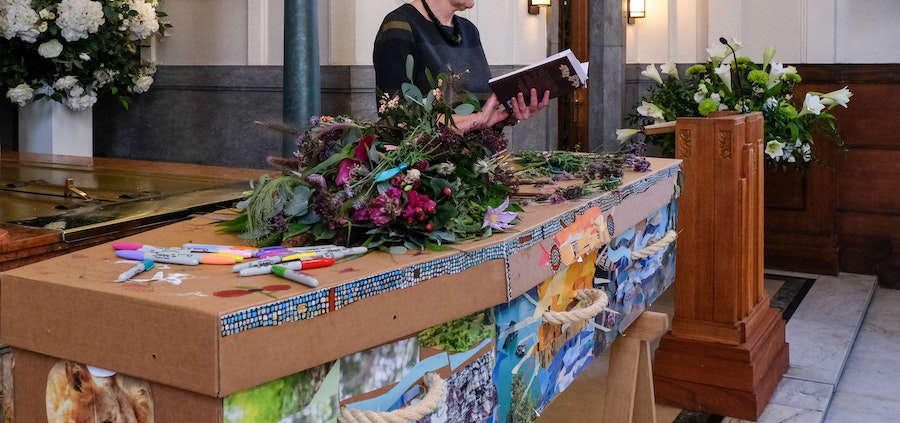Ashes to Ashes by Julie A. Ferraro

In September, Governor Gavin Newsom of California—against the wishes of the state’s Catholic bishops—signed a law that goes into effect in 2027 and allows for human composting, also known as natural organic reduction.
In 2020, the California Catholic Conference, via spokesman Steve Pehanich, told Religion News Service, “We believe that the ‘transformation’ of the remains would create an emotional distance rather than a reverence for them.”
Other state Catholic Conferences—where the process has already been, or soon will be, legalized—deem the process “inappropriate” (New York), that it “fails to show enough respect for the body of the deceased” (Washington), and goes against the sacred dignity of the human person (Colorado).
Wait a minute. Isn’t a key text in every funeral liturgy—and even on Ash Wednesday—about how human beings are, ultimately, ashes to ashes, dust to dust?
So, what is wrong with using an environmentally friendly process to reduce the shell of a human being, whose soul has gone to its eternal reward, to soil where life can grow anew?
After all, cremation has been approved by the church. It reduces a body to ashes, using fossil fuels and generating gases that add to climate change. Ultimately, what happens to a body buried in a cemetery? After years underground—despite being encased in concrete, a casket, and “preserved” with embalming fluid—the body decomposes, even poisoning the earth around it with the chemicals injected into the veins.
The method of human composting simply accelerates the process, eliminating the contaminants from the soil.
As it is described, the body is placed in a reusable “vessel.” It is covered with wood chips and then aerated. The microbes and bacteria do their work and reduce the matter to soil in about 30 days.
Whether it happens sooner or later, why do the bishops have a problem with this?
I’ve been opposed to the entire funeral ordeal for nearly 50 years. It may be voiced that blessing the deceased with a Mass of Christian Burial and holy water sprinkled over the casket or urn is essential.
The fact is, funerals are for the living, not the dead. The liturgies are a means to comfort those who are dealing with the loss of a loved one, be it from old age or an untimely tragedy.
Sadly, this creates opportunities for those who operate the mortuaries, and those who own the cemeteries, to play upon the grief of a widow, widower, or children who want to “do right” by their deceased relative.
I recall when my (adopted) mother died in 1989. We’d known it would happen eventually, since she’d been dealing with bone cancer for nearly two years. My (adopted) father was, understandably, upset; they’d been married for 38 years. At the funeral home the next day, I was astonished when the director made a ridiculous suggestion.
The plot being used was one of four originally purchased by my (adopted) paternal grandfather. He and his wife were already buried in the two middle spots. Rather than have my mother on one side and my father (eventually) on the other, the funeral director said that my grandfather could be dug up and moved, so my mother and father could lie next to each other.
What I told my father was this: “When the grass grows back, no one will know who’s planted where.”
He agreed at the time. (When he died in 1999, my [adopted] brother did spend thousands getting that done.)
Funerals are all about appearances, as well. Tearful grieving is expected, as are black or darkly colored clothing.
At that 1989 funeral, many people mistook my behavior for grieving when, in actuality, I had a full-blown case of pneumonia (diagnosed the night before my mother passed) and was trying not to cough in people’s faces.
For my father’s funeral, which I did not attend so as not to start a public fracas with my brother, multiple priests and a bishop were present (my father had been former grand knight of the Knights of Columbus).
Did any of that pomp and circumstance really matter once the backhoe deposited the mound of dirt in the hole?
Not one bit.
The bishops need to integrate a practical sense of life and death into daily existence. Space for cemeteries is diminishing. The environmental impact of “traditional” burial contributes to the bleak future of the planet. Cremation fouls the atmosphere with pollutants.
When the resurrection comes, do these clerics not believe that an omniscient God can pull the particles of millions of decomposed bodies into their original forms? Except for the recently dead, they will all have returned to dust and ashes, as it is.
Once again, the bishops should focus on helping the living. Wasting time and money politicking against legislation that fails to feed the hungry, shelter the homeless, or clothe the naked negates what Jesus said about doing for the least of his people.
Burying the dead may be one of the corporal works of mercy, but Jesus never mentioned it among giving drink to the thirsty and visiting the sick.
Perhaps if more people adopted a pragmatic attitude about funerals and burial—including the clergy—the grieving process itself would be transformed.
As for me, I’ve long since told my sons: “Scrap me out for parts, fry what’s left, scatter the ashes, and throw a party.”
In other words, donate my organs and cremate me.
The cremation, though, will be amended to “compost me.” I think I’d like having a tree grow from my remains, or some plants—especially since I’ve had little luck growing them while I’ve been alive! ♦
Julie A. Ferraro has been a journalist for over 30 years, covering diverse beats for secular newspapers as well as writing for many Catholic publications. A mother and grandmother, she currently lives in Atchison, Kansas. Her column, “God ‘n Life,” appears regularly in Today’s American Catholic.





Leave a Reply
Want to join the discussion?Feel free to contribute!